Post
A catch
Save a catch to start your fishing logbook. You will be able to to share it with the community if yo want!
A fishing trip
Post an ad to go fishing with other fishermen
Save a catch to start your fishing logbook. You will be able to to share it with the community if yo want!
Post an ad to go fishing with other fishermen
Share a thought, a question with the community
My favorite cities
×Join our 1 fisherman in Bob-White in Boone. The fishing forecast is currently 3.9. The most caught fishes here are the white bass, the pallid sturgeon, the bronze bream and the northern pike. Come try the most famous fishing techniques like the gathering seafood by hand, boat fishing for eel, bass trolling or trolling.
Our fishing forecast of Bob White indicates the best time to go fishing in this city.
The White Bass
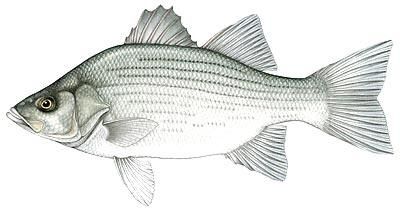
The White Bass belongs to the Moronidae family. Its maximum length is 46 cm and its maximum weight is 3.2 kg. Its maximum lifespan is 15 years. Spawning takes place from March to May. The best time to catch it is from mid-April to mid-May. As with other true basses, the dorsal fin is clearly double, separated into thorny and soft-raked parts. White Bass is a silvery shade ranging from dark grey or black on the back to white on the belly. Several incomplete lines or stripes extend horizontally on either side of the body. Adults look like a young striped bass, and the two are often confused. However, the striped bass has two distinct pieces of teeth on the back of the tongue, and the white wolf has one piece of tooth. The striped bass has two points on each cap, unlike the white bass which has one, and the second spine of the anal fin measures about half of the third spine of the striped bass, while it is about two thirds the length of the third spine in White Bass.
The White Bass is a famous fish you can catch in Bob White.The Pallid Sturgeon
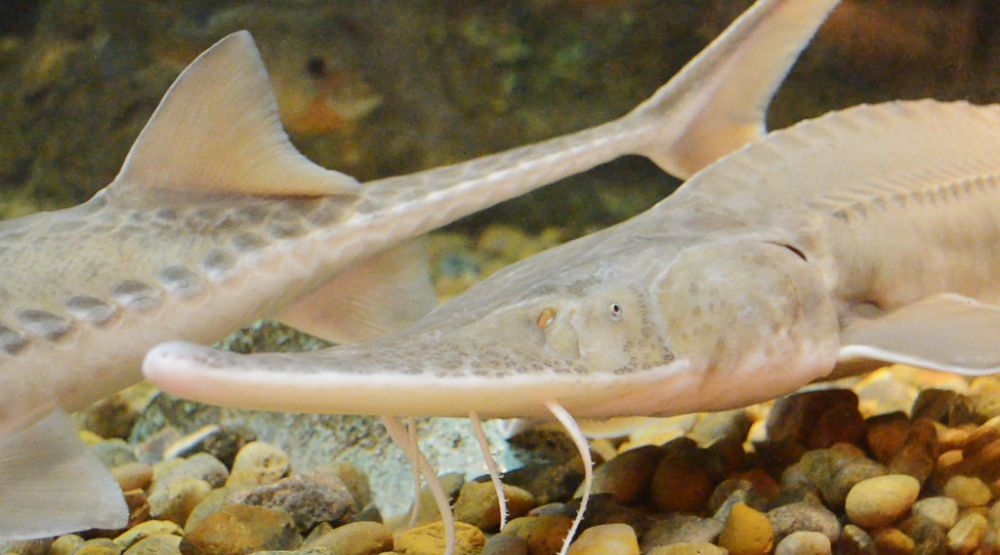
The Pallid Sturgeon belongs to the Acipenseridae family. it measures between 70 and 150 cm long and 39 kg in adulthood. The Pallid Sturgeon takes 15 years to reach maturity, and can live for more than a century. it breeds from May to July. Considered as endangered, it cannot be caught. Like the other Acipenseridae, it is considered as a "living fossil". The Pallid Sturgeon has a characteristic appearance that makes it to be qualified as "primitive" or "dinosaur". It has a pale color, especially in adults who fade with time, with a greyish back and sides. Its caudal fin is heterocercal, with an upper lobe more developed than the lower lobe. Like other sturgeons, the Pallid Sturgeon has no calcified scales or bones, unlike more recent fish species. It has a cartilaginous skeleton with five rows of thick patches that extend along its sides, belly, back and most of its head. These plates are covered by the skin and protect the animal. This cartilage also extends to the back of the fish’s body, between the dorsal fin and the tail. The mouth starts well set back from the tip of the head. Because it has no teeth, it uses this stretchy mouth to suck small fish, shellfish and other foods from the bottom of the river. Like all sturgeons, it has four barbells. We think they have a sensory role in detecting food.
The Pallid Sturgeon is a famous fish you can catch in Bob White.The Bronze Bream
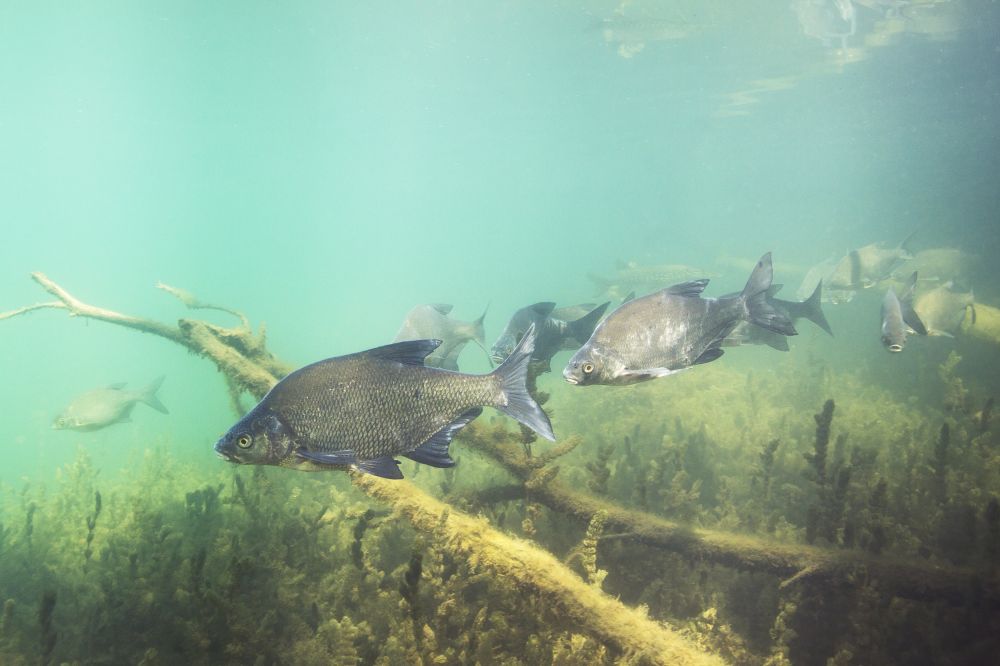
The Bronze bream belongs to the Cyprinidae Family. The current catch size varies between 30 and 50 cm, for a weight of 0.5 and 2.5 kg. Some individuals can reach a maximum height of 80 cm for a weight of 7 kg. It lives between 20 and 25 years. It reproduces between April and June and lay 100,000 to 300,000 eggs. The Bronze Bream can be fished all year round in 2nd category streams and is not hard to catch with the right bait. In Europe, there are 2 or 3 types of bream, 5 species and 2 subspecies. The Bronze bream has a very high and strong body flattened laterally. The bushy back, especially in older individuals, is characteristic of this fish. Its body is covered with large scales and mucus. The Bronze bream has a fairly small eye compared to the size of the muzzle. The mouth is small, oblique, barbless and protractile. The upper jaw protrudes beyond the lower jaw. Teeth are subject to seasonal replacement. The anal fin is very long and has 23-30 soft rays. On the other hand, the dorsal fin is short and inserted behind the pelvic fins. The caudal fin is very indented with the lower lobe longer than the upper lobe.
The Bronze Bream is a famous fish you can catch in Bob White.The Northern Pike
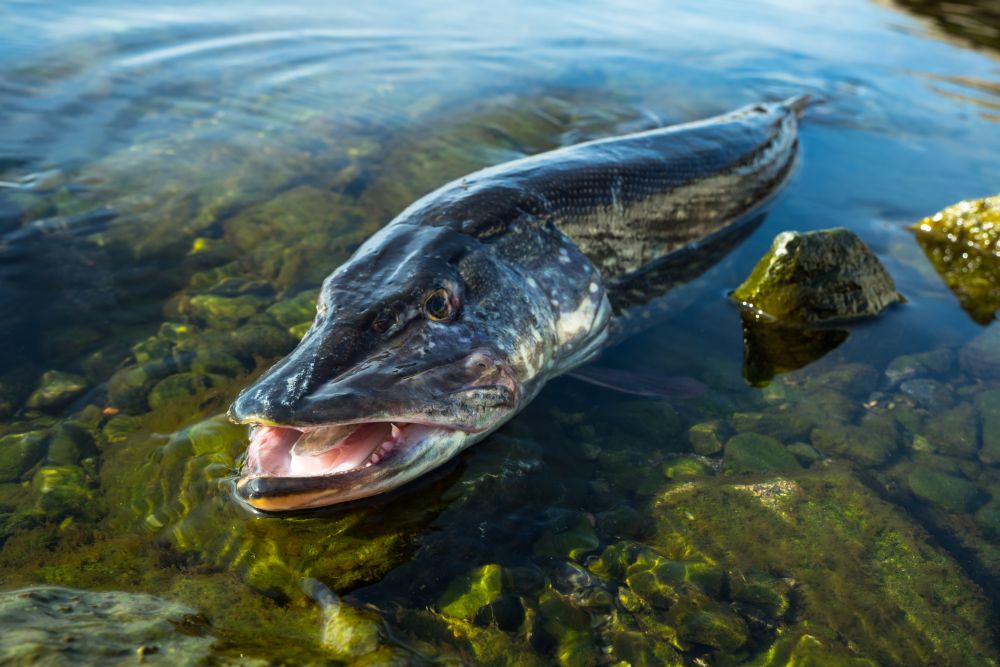
The Northern Pike belongs to the Esocidae family. The Northern pike have an average length of 46 to 51 cm. The maximum weight recorded was 28.4 kg. The average weight is about 1.8 kg. It has a lifespan of about 12 years. It reproduces in the springs. It can be fished in early spring. They can be identified by their one dorsal fin and by light spots along their dark bodies. They can also be identified by the scales that cover their entire cheek and upper half of their gills. Their close relative, the muskellunge (Esox masquinongy), has only scales that cover only the upper half of the cheek and gill covers. The sides of E. lucius range from dark green to olive green to brown, with 7 to 9 rows of yellowish bean-shaped spots. The underside is white to cream.
The Northern Pike is a famous fish you can catch in Bob White.The Paddlefish
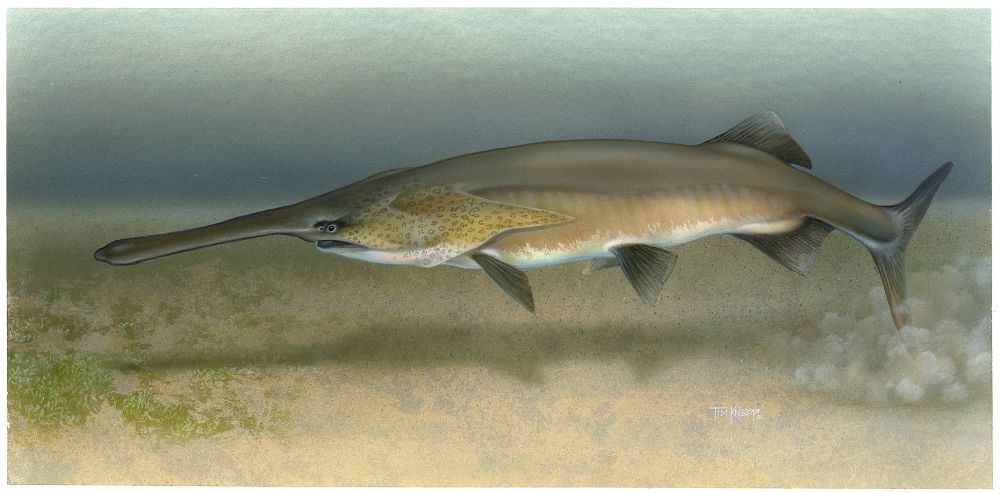
The Paddlefish belongs to the Polyodontidae family. The adult size is between 1.2 m to 1.8 m. It has a lifespan of 20 to 30 years. They spawn in April to May. It can be fished from mid-May to June. The long paddle-shaped snout of this fish represents about one-third of its total body length. The snout helps stabilize fish as they swim and also contains specialized cells that help detect swarms of plankton that this species feeds on. The skin is smooth. Small individuals are pink at the back and white at the base; for older people, around 25 à 30 cm, the body color changes to bluish grey on the back and cream on the vent. The eyes are small compared to the rest of the head and body. On the underside of the snout are two little barbells in front of a large, toothless mouth. When seen through the mouth, the gills are large and show the many closely spaced filaments that trap microscopic food. On each side, a gill cover extends backwards, ending with a long pointed flap. The skeleton is composed of cartilage rather than bone. The tip of the spine extends into the upper lobe of the heterrorcercal tail, much like a shark does.
The Paddlefish is a famous fish you can catch in Bob White.Our fishing forecast of Bob White indicates the best time to go fishing in this city.
Our fishing forecast of Bob White indicates the best time to go fishing in this city.
Our fishing forecast of Bob White indicates the best time to go fishing in this city.
